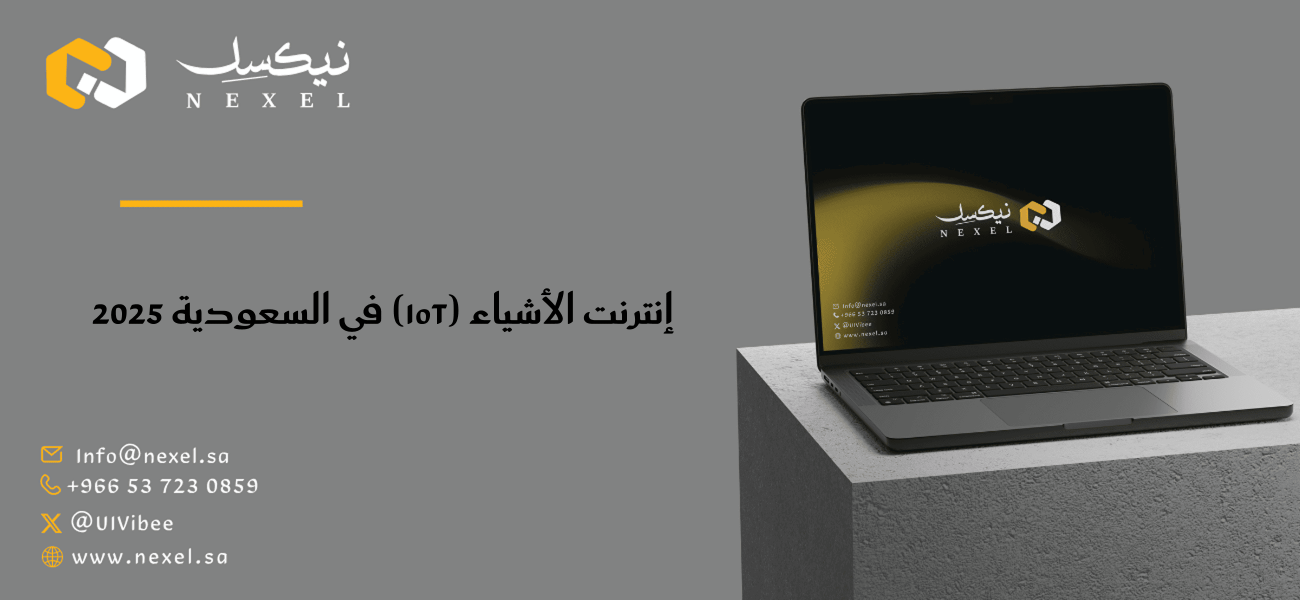Internet of Things (IoT) in Saudi Arabia 2025 | How Software Drives the Future of Digital Transformation
In recent years, the term Internet of Things (IoT) has become one of the most widely discussed concepts in the world of technology and digital transformation. Devices connected to the internet are no longer considered a luxury—they have become a critical necessity for businesses, governments, and individuals alike. With Saudi Arabia accelerating its Vision 2030, the Kingdom aims to be one of the leading countries adopting IoT technologies in the region and worldwide.
But the most important question is: What is the relationship between software and IoT?
Simply put, no matter how advanced the devices are, they are meaningless without operating systems, data analytics platforms, and intelligent software capable of managing, operating, and interpreting the massive amounts of information. This is where software, SaaS, and cloud solutions act as the beating heart that turns IoT into a tangible reality.
What is the Internet of Things (IoT)?
The Internet of Things is a vast network of devices, tools, and systems connected to the internet, capable of collecting, exchanging, and processing data in real time. These devices may include:
-
Home devices (smart air conditioners, refrigerators, lighting systems).
-
Medical devices (health trackers, patient monitoring devices).
-
Industrial systems (production machines, quality monitoring sensors).
-
Connected vehicles.
-
Smart city systems (traffic, energy, water, security).
Why is it revolutionary?
IoT connects the physical world with the digital world. Everything around us becomes capable of communicating, sharing data, and interacting intelligently. This, however, cannot happen without software that drives this ecosystem.
The Role of Software in IoT
Without software, IoT cannot function. Devices are just "hardware" without intelligence. Software plays four critical roles:
-
Operating Systems: Power smart devices.
-
Cloud-based SaaS platforms: Connect devices to the internet and aggregate data.
-
Big Data Analytics: Process millions of events coming from sensors.
-
Cybersecurity: Secure the data exchange between devices and servers.
For example, a temperature sensor in a factory sends data every second. Who handles this data? Cloud software collects it, displays it on dashboards, and analyzes it to predict potential failures.
IoT in Saudi Arabia and Vision 2030
The Kingdom seeks to be a global technology powerhouse, and IoT is a cornerstone of this transformation.
Examples of IoT Projects in Saudi Arabia:
Smart Cities:
-
NEOM Project, which relies on IoT to manage traffic, water, energy, security, and even smart homes.
-
Other initiatives like Al-Ula Smart City and Riyadh Smart City.
Healthcare:
-
Smart devices to monitor patients remotely.
-
Digital health platforms powered by IoT and SaaS.
Industrial Sector (Industry 4.0):
-
Fully automated factories using IoT sensors and intelligent software.
-
Production line monitoring and predictive maintenance.
Transportation and Logistics:
-
Connected trucks tracking the movement of goods.
-
Smart tracking systems for shipping and distribution.
The Connection Between IoT and SaaS in Saudi Arabia
Why is SaaS essential for IoT?
IoT generates massive amounts of data.
Startups and even large enterprises cannot build their own servers to manage this volume.
The solution? Software as a Service (SaaS), which provides ready-made platforms for storage, processing, and cloud analytics.
Practical Example:
A Saudi agri-tech startup installs soil moisture sensors in date palm farms. The data is sent to a SaaS platform that analyzes it and sends alerts to farmers via a mobile app.
Challenges of IoT in Saudi Arabia
Despite significant advancements, some challenges remain:
Cybersecurity:
-
Every connected device is a potential entry point for attacks.
-
Saudi Arabia needs advanced security software to protect its data.
Device Interoperability:
-
Devices from different manufacturers need standardized protocols.
Infrastructure:
-
Saudi Arabia has invested in 5G networks to accelerate IoT adoption.
Skill Shortage:
-
Universities and training programs need to graduate developers specialized in IoT software.
How Startups in Saudi Arabia Can Leverage IoT
-
Develop smart SaaS solutions tailored to specific sectors (agriculture, healthcare, commerce).
-
Build IoT integration platforms to manage devices from different manufacturers.
-
Offer data analytics services for large enterprises.
-
Provide specialized security solutions to protect networks.
Examples of Software Managing IoT
-
AWS IoT Core: Amazon’s cloud-based IoT platform.
-
Microsoft Azure IoT: Integrated solutions with AI capabilities.
-
Google Cloud IoT.
-
NEXEL Saudi Arabia: A local provider offering SaaS solutions customized for Saudi companies, compliant with local data regulations.
The Future of IoT in Saudi Arabia
By 2030, Saudi Arabia’s IoT investments are expected to reach billions of dollars.
-
Widespread adoption of autonomous vehicles.
-
Fully automated factories.
-
Cities managed entirely through software.
-
Integration of IoT with AI and Digital Twin technologies.
Frequently Asked Questions (FAQ)
1. What is IoT?
A network of devices connected to the internet capable of collecting and analyzing data.
2. Why is SaaS important for IoT?
It provides ready-made platforms for processing and storing data without complex infrastructure.
3. How does Saudi Arabia benefit from IoT?
Through smart cities, digital healthcare, industrial transformation, and intelligent logistics.
4. Are there challenges in adopting IoT?
Yes, including cybersecurity, infrastructure, and device interoperability.
5. What role do companies like NEXEL play?
They build local SaaS platforms, provide market-compliant solutions, and develop smart applications for startups.
Conclusion
IoT is no longer a distant future; it is a reality unfolding in Saudi Arabia. With Vision 2030, it is expected to play a pivotal role across all sectors: healthcare, industry, commerce, and daily life.
However, true success does not come from devices alone but from the software that enables them to think, analyze, and communicate. The partnership between IoT and software (especially SaaS) is the foundation for building a robust digital economy in the Kingdom.
Companies like NEXEL emerge as key enablers, bridging smart devices and cloud software, offering advanced solutions that support the ambitions of individuals, businesses, and the state on their path to digital leadership.

Add New Comment